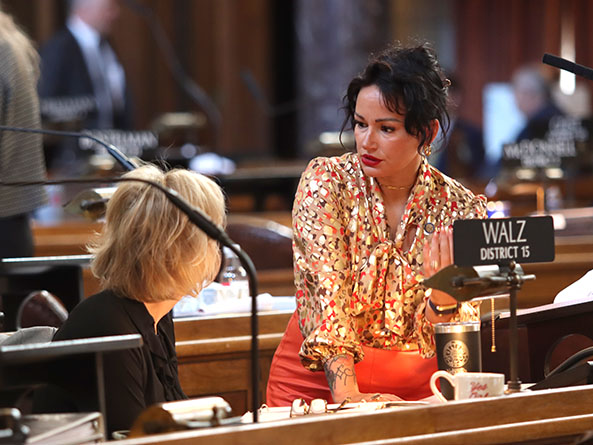Behavioral health points of contact for schools amended, advanced
Lawmakers gave first-round approval March 28 to a bill intended to improve access to mental and behavioral health services for public school students after amending it to include a proposed mental health first aid training program.

LB852, introduced by Omaha Sen. Jen Day, would require each school district to designate at least one employee in each school building who has knowledge of community behavioral health service providers and other resources for students and families.
The behavioral health point of contact would coordinate access to behavioral health services for students and families and facilitate access to services at a student’s school during the school day whenever possible and as approved by a student’s parent or guardian.
An Education Committee amendment, adopted 33-2, clarifies that points of contact would be required to coordinate access to services at all times, not “whenever possible.”
Under LB852 as introduced, a point of contact could be an administrator, a school nurse, a school psychologist or another designated employee.
Day introduced an amendment, adopted 34-0, that also would allow schools to designate a person affiliated with a particular school building or other division as a point of contact.
She said this would give schools more flexibility by allowing them to assign that responsibility to a contracted educational service unit staff member who works in a school building.
Day said LB852 would not require schools to hire a staff member to serve as a point of contact or provide training to that person.
The bill would require the state Department of Education to provide each district with a registry of state and local behavioral health resources for students and families by geographic area. It also would require the registry to be updated at least annually and include both school-based services and those accessible outside of school.
Each district would report its designated behavioral health points of contact to the department before the beginning of each school year.
Fremont Sen. Lynne Walz supported the bill, saying it has broad support among Nebraska schools. She said a similar process implemented at Ralston Public Schools several years ago has helped many students, families and school staff members work through mental and behavioral health crises.
“Let’s replicate those remarkable outcomes across the state,” Walz said.
Sen. Adam Morfeld of Lincoln introduced an amendment, adopted 28-0, that includes provisions of his LB912.
The proposal would require the department to create a mental health first aid training program for teachers and other school personnel employed by a school district or ESU participating in a State Board of Education grant program.
Morfeld said grants would be funded by state lottery proceeds.
The training would be provided by trainers who are certified by a national organization for behavioral health and would include the skills, resources and knowledge necessary to help connect students with appropriate local mental health care services.
Teachers and other school personnel also would learn how to safely de-escalate crisis situations, recognize the signs and symptoms of mental illness and refer a student to mental health services in the early stages of the development of a mental disorder.
Following adoption of the amendments, LB852 advanced to select file on a vote of 27-0.


